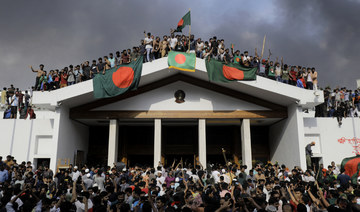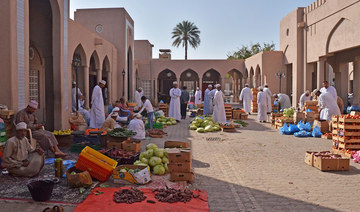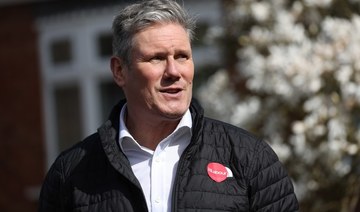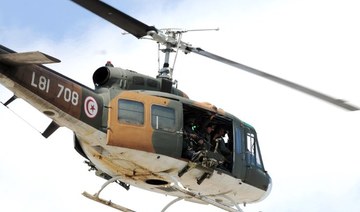PARIS: Zakia Khudadadi has spent most of her life breaking through glass ceilings. Or rather, smashing through them with a sidekick.
The taekwondo Paralympian made history in 2021 in Tokyo, becoming the first Afghan woman to compete in an international sporting event since the Taliban took back control of her country as US and NATO troops withdrew following 20 year of war.
Originally blocked from competing following the rise of the Taliban, she was later evacuated from Afghanistan and allowed to compete for her country following a plea from the international community.
In the 2024 Paralympics, part of the wider Olympic competitions in Paris, Khudadadi said she is competing in the name of women in her country who have gradually been stripped of their rights over the past three years.
“It’s hard for me because I’d like to compete under my country’s flag,” she said. But “life for all girls and women in Afghanistan is forbidden. It’s over. Today, I’m here to win a medal in Paris for them. I want to show strength to all women and girls in Afghanistan.”
Khudadadi is competing for the Refugee Paralympic Team, while other athletes are seeking medals under Afghanistan’s flag, such as Olympic sprinter Kimia Yousofi. Yousofi’s parents fled during the Taliban’s previous rule and she was born and raised in neighboring Iran. She said she wanted to represent her country, flaws and all, and wanted to “be the voice of Afghan girls.”
For Khudadadi, she began practicing taekwondo at 11, training in secret at a gym in her hometown of Herāt because there were simply no other opportunities for women to safely practice sports. Despite a closed culture around her, Khudadadi said her family was open and would push her to be active.
Compounding her struggles to compete in Afghanistan, she said, was her disability.
Despite having “one of the largest populations per capita of persons with disabilities in the world” due to conflict, people with disabilities are often shunned and blocked from Afghan society, according to Human Rights Watch. Women are often disproportionately affected.
Born without one forearm, Khudadadi said she spent her life hiding her arm. It was only when she started competing that it began to change.
“Before I started in sports, I protected myself a lot with my arm. But little by little ... I started showing my arm, but only in the club. Only while competing,” she said.
As she began to compete, she said she felt that stigma begin to melt away. Taekwondo once again became her path to freedom, and she gained attention in 2016, when she medaled internationally for the first time.
That all changed five years later, when the Taliban made a dramatic ascent to power following the Biden administration’s withdrawal from Afghanistan. While preparing for Tokyo, Khudadadi was trapped in the country’s capital, Kabul.
The International Paralympic Committee originally issued a statement saying the Afghan team wouldn’t participate in the Games held in 2021 “due to the serious ongoing situation in the country.” But in a bid to compete, Khudadadi released a video pleading with the international community for help.
“Please, I urge you all, from the women around the globe, institutions for the protection of women, from all government organizations, to not let the rights of a female citizen of Afghanistan in the Paralympic movement to be taken away, so easily,” she said. “I don’t want my struggle to be in vain.”
She was evacuated to Tokyo in 2021 to compete, leaving behind her family.
By doing so, she became the first Afghan female Paralympian in nearly two decades. In 2023, she won gold at the the European Para Championships.
Following her flight from Afghanistan, she settled in Paris, but she said she aches for the mix of cultures that paints her country and the openness of the people wandering the bustling streets of Kabul.
“I hope some day I’ll be able to return to Afghanistan, to Kabul, to live life together in freedom and peace,” she said.
Thousands of miles away in Khudadadi’s hometown of Herat, 38-year-old Shah Mohammad was among throwing their support behind Khudadadi and other Afghan female athletes in Paris.
“We are happy for the Afghan women who have gone to the Olympics, but my wish is that one day women from inside Afghanistan can participate in the Games and be the voice of women from the country,” Mohammad said.
That day is unlikely any time soon.
The Taliban have cut women from much of public life and blocked girls from studying beyond the sixth grade as part of harsh measures they have imposed since 2021 despite initially promising more moderate rule. Just in January, the United Nations said the Taliban are now restricting Afghan women’s access to work, travel and health care if they are unmarried or have no male guardian.
They haven’t just banned sports for women and girls, they have intimidated and harassed those who once played.
But even before the Taliban’s return to power, women’s sports were opposed by many in the country’s deeply conservative society, seen as a violation of women’s modesty and of their role in society.
Still, the previous, Western-backed government had programs encouraging women’s sports and school clubs, leagues and national teams.
For Khudadadi, the IOC’s refugee team helped her and other athletes who have fled their countries continue their careers. The Paralympian trains long hours — eyes set on a gold medal in Paris — with deep frustration as she’s watch strides for women in her country erode, and Afghanistan once again fall out of the global spotlight.
One question simmers in Khudadadi’s mind: “Why the world has forgotten Afghan women?”
Still, for others like Mohammad Amin Sharifi, 43, watching Khudadadi and other Afghan Olympians in Paris, especially women, has been a point of pride for people like him in Afghanistan.
“Right now, we need Afghan women’s voices to be raised in any way possible and the Olympics are the best place for that,” Sharifi said from Kabul. “We are happy and proud of the women representing the Afghan people.”

























